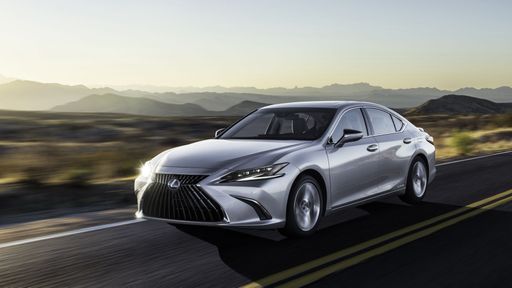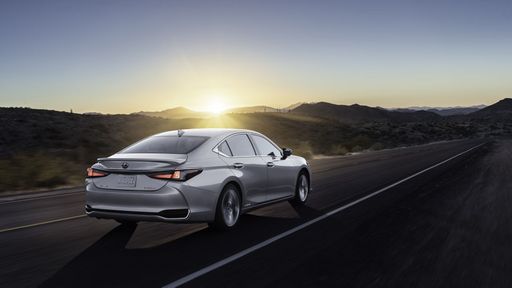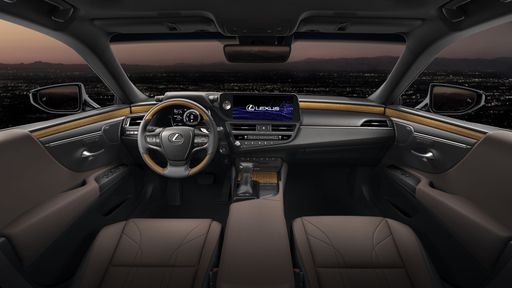Lexus ES vs Renault R4 – Differences & prices compared
Compare performance, boot space, consumption and price in one view.
Find out now: which car is the better choice for you – Lexus ES or Renault R4?
The Lexus ES (Sedan) comes with a Full Hybrid engine and Automatic transmission. In comparison, the Renault R4 (SUV) features a Electric engine with Automatic transmission.
When it comes to boot capacity, the Lexus ES offers 454 L, while the Renault R4 provides 420 L – depending on how much space you need. If you’re looking for more power, decide whether the 218 HP of the Lexus ES or the 150 HP of the Renault R4 suits your needs better.
In terms of consumption, the values are 5.10 L per 100 km for the Lexus ES, and for the Renault R4.
Price-wise, the Lexus ES starts at 46600 £, while the Renault R4 is available from 25200 £. Compare all the details and find out which model fits your lifestyle best!
Lexus ES
The Lexus ES represents a blend of luxury and comfort, offering a smooth driving experience that is characteristic of the brand. With its elegant design and meticulously crafted interior, it provides a serene environment for both driver and passengers. The inclusion of advanced safety features and cutting-edge technology enhances its appeal, ensuring that every journey is not only enjoyable but also secure.
details @ toyota-media.de
@ toyota-media.de
 @ toyota-media.de
@ toyota-media.de
 @ toyota-media.de
@ toyota-media.de
Renault R4
The Renault R4, affectionately known as the "R4," is a quintessential symbol of French automotive simplicity and practicality. This classic compact car, originally introduced in the early 1960s, won over numerous enthusiasts with its versatile design and dependable performance. Its no-frills charm and robust build made it a beloved choice for rural drivers and city dwellers alike, cementing its status as an iconic piece of automotive history.
details

|
|
|
|
|
Costs and Consumption |
|
|---|---|
|
Price
46600 - 59300 £
|
Price
25200 - 31200 £
|
|
Consumption L/100km
5.10 L
|
Consumption L/100km
-
|
|
Consumption kWh/100km
-
|
Consumption kWh/100km
-
|
|
Electric Range
-
|
Electric Range
322 - 409 km
|
|
Battery Capacity
-
|
Battery Capacity
40 - 52 kWh
|
|
co2
115 g/km
|
co2
0 g/km
|
|
Fuel tank capacity
50 L
|
Fuel tank capacity
-
|
Dimensions and Body |
|
|---|---|
|
Body Type
Sedan
|
Body Type
SUV
|
|
Seats
5
|
Seats
5
|
|
Doors
4
|
Doors
5
|
|
Curb weight
1680 kg
|
Curb weight
1485 - 1537 kg
|
|
Trunk capacity
454 L
|
Trunk capacity
420 L
|
|
Length
4975 mm
|
Length
4144 mm
|
|
Width
1865 mm
|
Width
1808 mm
|
|
Height
1445 mm
|
Height
1552 mm
|
|
Payload
470 kg
|
Payload
410 - 443 kg
|
Engine and Performance |
|
|---|---|
|
Engine Type
Full Hybrid
|
Engine Type
Electric
|
|
Transmission
Automatic
|
Transmission
Automatic
|
|
Transmission Detail
-
|
Transmission Detail
-
|
|
Drive Type
Front-Wheel Drive
|
Drive Type
Front-Wheel Drive
|
|
Power HP
218 HP
|
Power HP
122 - 150 HP
|
|
Acceleration 0-100km/h
8.90 s
|
Acceleration 0-100km/h
8.2 - 9.2 s
|
|
Max Speed
180 km/h
|
Max Speed
150 km/h
|
|
Torque
-
|
Torque
225 - 245 Nm
|
|
Number of Cylinders
4
|
Number of Cylinders
-
|
|
Power kW
160 kW
|
Power kW
90 - 110 kW
|
|
Engine capacity
2487 cm3
|
Engine capacity
-
|
General |
|
|---|---|
|
Model Year
2024
|
Model Year
2025
|
|
CO2 Efficiency Class
C
|
CO2 Efficiency Class
A
|
|
Brand
Lexus
|
Brand
Renault
|
Lexus ES
Explore the Alluring Elegance of the Lexus ES
The Lexus ES continues to uphold its reputation as a beacon of luxury and innovation in the automotive world. Known for its graceful design and premium feel, the ES series offers an impressive blend of performance and efficiency. With a focus on technical prowess and sustainability, this model is a testament to Lexus's commitment to excellence.
Performance and Efficiency: A Seamless Blend
At the heart of the Lexus ES is its full-hybrid technology. The 218 PS powertrain, featuring a 4-cylinder engine, harmoniously integrates a combustion engine with an electric motor to provide a remarkable drive. The ES achieves its impressive power output of 160 kW while maintaining a commendable fuel consumption of 5.1 L/100 km. This balance between power and efficiency is manifested in its acceleration from 0 to 100 km/h in just 8.9 seconds, powering seamlessly through a cost-effective CVT-gearbox with front-wheel drive. Despite its athletic capabilities, the ES remains well within the bounds of responsible emissions with a CO2 output rated at 115 g/km.
Design and Comfort: A Statement of Luxury
The Lexus ES's exterior is crafted as a testament to sophistication. Its sleek silhouette measures 4975 mm in length, 1865 mm in width, and 1445 mm in height, with a striking aesthetics that demands attention. The interior offers spacious comfort with seating for five, highlighted by high-quality materials and meticulous attention to detail. Additionally, the boot space offers a generous 454 litres capacity, ensuring practicality is not compromised.
Technological Advancements and Features
Equipped with the latest in automotive technology, the Lexus ES features a suite of advanced driver-assistance systems for enhanced safety and convenience. From its responsive infotainment system to the intuitive controls, each feature has been designed with the driver in mind. For those seeking variety, the car is available in several trim levels including the Automatik, Business Edition Automatik, Executive Automatik, and Luxury Automatik, offering a tailored experience for every discerning driver.
Cost of Ownership
With prices ranging from €54,350 to €69,200, the Lexus ES provides a competitive edge in the luxury segment with its multitude of features. The running costs are also reasonable, with expense estimates ranging from €1,289 to €1,497 per month and a cost per kilometre between 51.6 and 59.9 cents. This cost efficiency makes it a feasible choice for those looking to balance luxury with practicality.
Conclusion: A Hybrid of Innovation and Style
The Lexus ES stands as a prime example of how hybrid technology can transform the driving experience, merging the thrill of performance with the benefits of fuel efficiency. With its state-of-the-art features and impeccable build, the ES is a remarkable vehicle for those who seek luxury and innovation on the road.
Renault R4
The Timeless Charm of the Renault R4: A Journey from Classic to Contemporary
The Renault R4 is an iconic name that echoes through automotive history, its roots deeply entrenched in the legacy of Renault's innovative engineering. As we usher into 2025, the classic appeal of the R4 meets modern innovation with the latest electric versions. Let's explore what makes the Renault R4 a remarkable blend of nostalgia and technology.
A Classic Reinvented: The Renault R4 Specifications
The Renault R4 is primarily an SUV, showcasing its versatility as both a practical family car and an adventurous road companion. The latest model comes with the robustness and aesthetic appeal we've come to expect from Renault, enhanced by cutting-edge electric powertrains.
Designed as an electric vehicle, the new Renault R4 variations come with different battery capacities ranging from 40 kWh to 52 kWh. These provide impressive ranges of up to 322 kilometers and 409 kilometers, catering to both urban and suburban travel needs. The power output ranges from a respectable 122 HP to a more robust 150 HP, ensuring a dynamic driving experience.
Performance Meets Innovation
The Renault R4 is equipped with front-wheel drive and automatic transmission, offering smooth and efficient performance. Speed enthusiasts will appreciate the acceleration from 0 to 100 km/h in just 8.2 to 9.2 seconds, while adhering to a maximum speed of 150 km/h. Torque figures range from 225 Nm to 245 Nm, ensuring responsive handling and robust performance on various terrains.
Weighing between 1485 kg and 1537 kg, the R4 balances weight and power adeptly. It boasts a trunk capacity of 420 liters, catering to family trips, weekend getaways, or simple grocery runs with ease. The modern design accommodates five passengers comfortably, with ample space and quality interiors.
Sustainable Future: The Eco-Friendly Appeal
Reducing carbon footprints is a significant feature of the new Renault R4, which stands proudly with a CO2 emission rate of 0 g/km, placing it in the A class for CO2 efficiency. This marks a step towards achieving environmentally-friendly transportation without compromising the significant power and performance expected from a traditional SUV.
Comfort and Utility: Perfect for Modern Lifestyles
Renault has crafted the R4 to suit the needs of the modern driver, focusing on comfort, utility, and sustainability. It measures 4144 mm in length, 1808 mm in width, and 1552 mm in height, perfect for navigating both city streets and open highways. The payload capacity ranges between 410 kg and 443 kg, demonstrating its capacity for carrying both people and cargo efficiently.
Conclusion: The Renault R4 Legacy Continues
The Renault R4 continues to be a symbol of innovation and practicality. Its evolution from past to present-day models features a brilliant synthesis of nostalgic allure and state-of-the-art technology. With its recent models, the R4 not only preserves its iconic status but also sets new standards for electric SUVs in the modern market. As we look forward, the Renault R4 remains a cherished companion on the roads, echoing the spirit of exploration and sustainability.
Which drive types are available for the Lexus ES?
Available as Front-Wheel Drive.
The prices and data displayed are estimates based on German list prices and may vary by country. This information is not legally binding.
